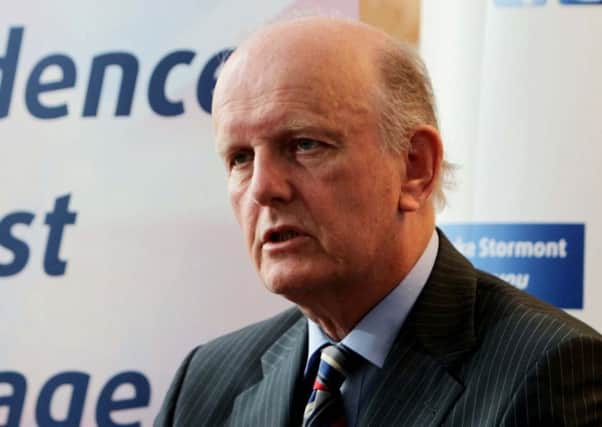'˜Public services in crisis as SF pushes Irish language'


Michael McGimpsey, Northern Ireland’s first culture minister and later its health minister, said Sinn Fein is currently dragging the negotiations through a “political labyrinth” over issues such as the Irish language, a Bill of Rights, and more.
In the meantime, he said “the population is suffering” due to problems with the education, policing and health systems.
Advertisement
Hide AdAdvertisement
Hide AdIn the last few days, the prospect of an Irish Language Act materialising appears to have become more likely, with DUP leader Arlene Foster pledging to meet with Irish activists (albeit ones whom she said did not have any “party political baggage”).
But Mr McGimpsey, a former South Belfast MLA, insisted that there was already a de facto Irish Language Act written into the text of the Good Friday Agreement.
When a new such act was agreed to as part of the St Andrews Agreement in 2006, he believes was down to “a lack of understanding” about how much was already in place to support the language.
Mr McGimpsey said these political priorities are “all upside down”.
Advertisement
Hide AdAdvertisement
Hide AdHe told the News Letter: “You’re looking at a backdrop of a health service which – in terms of primary care, in terms of secondary care, in terms of social care, all those areas – is in very, very serious trouble.
“Patients have long waits [and are] effectively coming to harm because the health service does not have the support that it needs from government, particularly in terms of the budget it needs.
“In terms of education, they’re in a similar situation.
“Look at also the situation that policing is in in terms of law-and-order and justice; the lack of funds going into the PSNI ensures that we’ve a police force that’s way below where it should be.”
He said that it has long been considered that Northern Ireland needs 7,500 full-time officers. At time of writing, there are roughly 6,800.
Advertisement
Hide AdAdvertisement
Hide Ad“What you’re looking at is financial mismanagement on a grand scale at Stormont,” he said.
“While those situations are developing and are live and are harming people, you’ve a situation where [Sinn Fein] are demanding an Irish Language Act (which we already have), demanding a Bill of Rights (which we already have under the European Convention), and issues under legacy.”
Sinn Fein’s demands on legacy in particular come amid what is already a highly-skewed justice situation he said, since the lion’s share of unsolved murders in the Province are republican ones, and yet “republicans have all been given on-the-run letters and pardons”.
Amid political deadlock over such issues continues, “the population is suffering through lack of support” he said, adding it is “absolutely irresponsible” that the Executive is not re-formed to deal with crises in public services.
Advertisement
Hide AdAdvertisement
Hide AdMr McGimpsey was the first person to take control of the newly-formed Department for Culture Arts and Leisure in 1999, running it until 2002. He was then health minister from 2007 to 2011.
He did not contest his Assembly seat last year.
Under the 1998 Good Friday Agreement, a deal was struck to create an all-island Irish language promotion body – Foras na Gaelige – something which was a “huge concession from unionists” said Mr McGimpsey.
The agreement also creates a “statutory duty on the Department of Education to encourage and facilitate Irish medium education”.
In 2006, when an Irish language act was included as part of the St Andrews Agreement, Mr McGimpsey “just assmumed that people didn’t understand what was in place” already under the Good Friday Agreement.
Advertisement
Hide AdAdvertisement
Hide AdWhilst the St Andrews Agreement commits to the establishment of an “Irish Language Act”, once that agreement came to be written into law at Westminster, the wording spoke only of establishing a language “strategy”, not an act.
According to figures released last month by the Department for Communities, only around 1% of Northern Ireland’s adult population can read a newspaper or book, or carry on a complex conversation, in Irish.